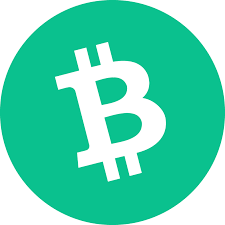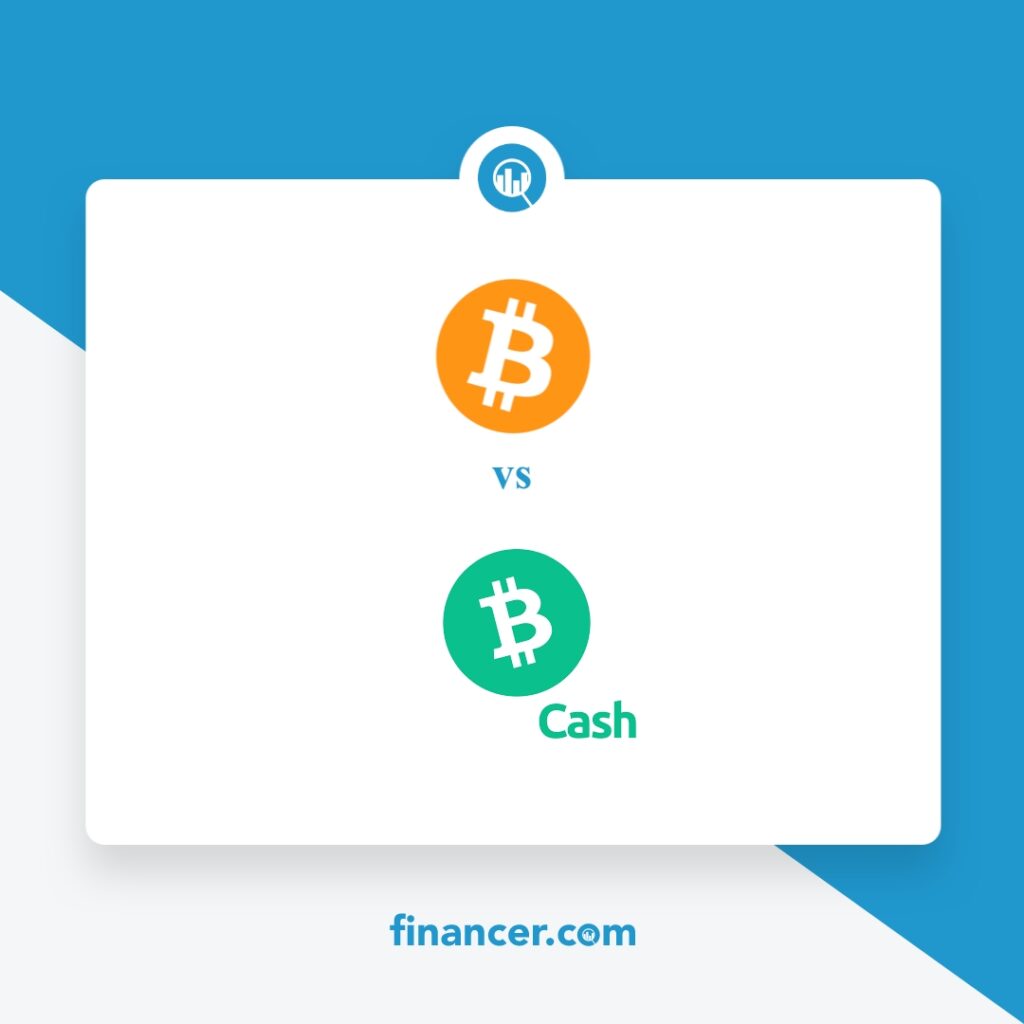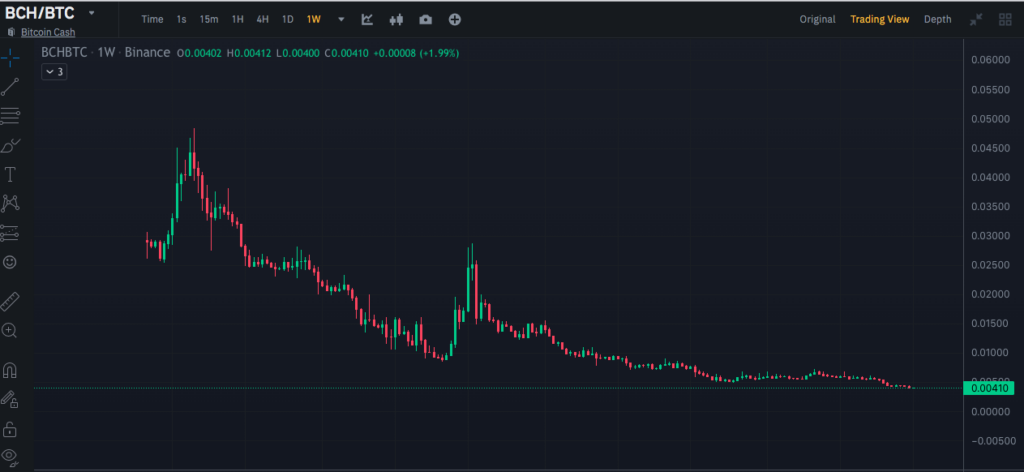Bitcoin Cash Price Data
The live Bitcoin Cash price today is $480.750 with a 24-hour trading volume of $332,139,903.
We update our BCH to USD price in real-time. The price of Bitcoin Cash has changed -5.47% in the last 24 hours.
Currently, Bitcoin Cash is the #16 largest cryptocurrency by market cap, with a live market cap of $9,493,263,279.00. It has a circulating supply of 19,696,425 BCH coins and a maximum supply of 21,000,000 coins.
See where to buy Bitcoin Cash or use our Bitcoin Cash Profit Calculator to calculate and track the performance of your investment.
Bitcoin Cash at a Glance
- As Bitcoin got popular and more people got on the network, one thing became clear: in times of high volume, fees get very expensive. This problem got serious in 2017 as fees rose to as high as $37.
- Arguments on how this problem was to be solved broke the Bitcoin community into two camps: those that proposed that the block size be increased to accommodate more transactions per block versus those that believed that creating a second layer was a better option.
- When these two groups couldn’t reach a consensus, a split in the network occurred that led to a new coin and new blockchain: Bitcoin Cash known by the ticker symbol BCH.
A Complete Beginner’s Guide to Bitcoin Cash
- 1.What is Bitcoin Cash?
- 2.Bitcoin Cash (BCH) versus Bitcoin (BTC)
- 3.What determines the price of Bitcoin Cash?
- 4.Bitcoin Cash price history
- 5.How does Bitcoin Cash work?
- 6.What is Bitcoin Cash used for?
- 7.Who are the founders of Bitcoin Cash?
- 8.What makes Bitcoin Cash unique?
- 9.How is Bitcoin Cash secured?
- 10.Who won the Bitcoin debate: BTC or BCH?
What is Bitcoin Cash?

Bitcoin Cash (BCH) is a cryptocurrency similar to Bitcoin (BTC). It originates from the original Bitcoin and is the product of a split – or in crypto terms – a hard fork from the core Bitcoin blockchain that happened in 2017.
Prior to the split, one of the major themes that dominated conversations in the Bitcoin community was scalability issues. As Bitcoin became popular and more people got on the network, transactions took longer to process, and transaction fees started to rise.
Two Rival Camps Emerge
By the summer of 2017, arguments on how the problem was to be solved had divided the Bitcoin community into two rival camps with differing propositions that fell into two categories:
- Those that proposed bigger blocks as a way of facilitating faster transactions
- Those that proposed maintaining the block size and solving the issue with a second layer that allowed for faster transactions.
Bitcoin was gaining traction and more mainstream attention which led to an overflow of transactions that made the network congested.
The increased congestion in the network led to delayed transactions and higher fees as users outbid each other to get their transactions processed faster. This situation led to a spike in fees that got as high as $37 per transaction.
At this point, the “big block” camp argued that the way forward was to increase the block size from 1 MB to 8 MB. While this seemed like the obvious solution to the problem, the rest of the Bitcoin community argued that bigger blocks would compromise Bitcoin’s security.
In the end, the big block camp created a version of the Bitcoin Blockchain with bigger blocks. This led to a split in the network and the other faction came to be known as Bitcoin Cash.
A Snapshot of Bitcoin Cash
- Bitcoin Cash was created with the vision to be the Bitcoin version suitable for everyday transactions like cash as the name suggests. Proponents of Bitcoin Cash argue that the original Bitcoin has derailed from Satoshi’s vision of a payment solution
- Ironically, Bitcoin Cash experienced its own hard fork the following year with the other faction picking the name Satoshi’s Vision.
- The main feature that separates Bitcoin Cash from the original Bitcoin is the size of its blocks. While Bitcoin limited its block size to 1 MB, Bitcoin Cash opted for a larger block size: 8MB.
- From a technical standpoint, Bitcoin Cash is very similar to the original Bitcoin. They both use the same consensus mechanism to verify transactions and have a hard cap of 21 million coins.
- The split of Bitcoin Cash from core Bitcoin is a strong testament to the decentralized nature of the Bitcoin network. It shows that no single entity has control over the network even when powerful groups are involved.
Why was it Bigger Blocks vs Smaller Blocks?

To understand why these recommendations were made and why they represented opposite ends of the Bitcoin scalability argument, you need to understand how transactions are processed on the Bitcoin blockchain.
The Bitcoin blockchain is like a giant spreadsheet that contains records of transactions except that instead of rows and columns like in a spreadsheet, transactions are recorded in blocks.
To keep transactions secure, blocks are linked together with a cryptographic hash that binds a block to prior blocks in a secure chain.
New transactions are grouped together in blocks and added to the blockchain every ten minutes on average. Because the size of a block is limited to 1MB, only a small amount of transactions can fit into one.
The Bitcoin blockchain can only process about 4000 transactions every ten minutes or roughly 7 transactions per second which is ridiculously small compared to traditional payment processors like Visa which can process up to 1700 transactions per second.
The small block size means that the network can get congested when a lot of people want to trade Bitcoin at the same time. While you can pay a higher fee to jump the queue, this can create a spiral of skyrocketing fees as more people try to skip the queue.
A new proposition
Since slow transactions posed a threat to Bitcoin’s scalability, it came to dominate conversations and part of the community proposed a new solution: increasing the block size to accommodate more transactions per block thereby increasing the transaction processing speed of Bitcoin.
Less congestion on the network would also mean lower fees since fewer people will be trying to jump the queue.
The new faction proposed increasing the block size to 8MB and subsequently to 32MB. However, the rest of the community rejected the proposition and suggested the development of the lightning network – a second-layer solution to solve the problem.
When the factions couldn’t reach a compromise, the big blocks faction implemented a solution that led to an alternate version of the blockchain that ultimately led to a new coin and blockchain.
The original Bitcoin went on to implement a layer 2 solution that allowed for faster transactions known as the lightning network.
Another Split in 2018
A year after splitting from the original Bitcoin, disagreements about block size in the Bitcoin Cash community led to another split in 2018 resulting in two versions: Bitcoin ABC and Bitcoin SV.
The Bitcoin ABC camp led by Rojer Ver and Bitmain sided with the original Bitcoin Cash.
The new faction – Bitcoin SV, which stands for Satoshi’s Vision – was led by billionaire Calvin Ayre and Craig Wright – a highly controversial personality who once claimed to be Satoshi Nakamoto.
The Bitcoin SV faction went on to increase the block size further to 128MB. Bitcoin SV is a cross between the original Bitcoin and Bitcoin Cash.
Bitcoin SV bears more similarity to the original Bitcoin than Bitcoin Cash but is also fast and cheap as Bitcoin Cash.
Bitcoin Cash (BCH) versus Bitcoin (BTC)

Bitcoin Cash bears a lot of similarities with Bitcoin. After all, it derived from the original Bitcoin.
Here are the differences that set BCH and BTC apart:
- As you may have probably guessed, the main distinction between the two is their block size: BCH has a bigger block size than BTC which means it can process transactions faster and is easier to send. However, BCH’s block size rarely exceeds 1MB since it doesn’t handle as many transactions as BTC.
- Bitcoin Cash also adjusts its mining difficulty more quickly than Bitcoin. While this allows for faster transactions, it makes the network less secure than Bitcoin.
- Unlike Bitcoin, BCH has smart contract capability.
- BCH does not support segwit or the lightning network.
What determines the price of Bitcoin Cash?
Just like Bitcoin, the value of Bitcoin Cash is determined by demand and supply. Increased buying activity leads to a spike in price while increased selling activity can lead to a decline in prices.
Like other altcoins, the price of Bitcoin Cash is also influenced by the price action of Bitcoin. A spike in the price of Bitcoin – which leads to more mainstream adoption influences the general crypto market. Sometimes this rubs off on Bitcoin Cash.
However, it is important to state that compared to Bitcoin, Bitcoin Cash has steadily lost market share over time.

Bitcoin Cash price history
Bitcoin Cash’s price history is characterized by major price swings that have seen it trade for as high as $4355 and as low as $76.
The table below provides more details on major price swings since 2017.
| Date | Event | Price |
|---|---|---|
| 20 December 2017 | Bitcoin Cash reaches its all-time high | 4355 USD |
| 15 November 2018 | Bitcoin SV is formed from Bitcoin Cash | 416 USD |
| December 16, 2018 | Bitcoin Cash reaches its all-time low | 76.93 USD |
How does Bitcoin Cash work?
Bitcoin Cash shares the same technical fundamentals as Bitcoin. For example, both blockchains use the Proof-of-Work consensus mechanism to validate transactions.
Like with Bitcoin, miners in the BCH network are rewarded with BCH coins for their contributions.
However, unlike Bitcoin, BCH transactions always get included in the next block. Faster transaction processing times mean that there are few people waiting for their transactions to be processed. Hence there are few people trying to jump the queue by paying higher fees.
Services that accept Bitcoin Cash do so with zero confirmations because Bitcoin Cash transactions are immediate.
Due to the bigger block size, BCH processes transactions faster than Bitcoin and is cheaper to send. However, it is best suited for smaller transactions.
Also, just like Bitcoin, the supply for BCH is capped at 21 million coins.
The real difference between Bitcoin and Bitcoin Cash has more to do with philosophy than technology.
What is Bitcoin Cash used for?
As the name suggests, Bitcoin Cash was created as the Bitcoin version that allowed for day-to-day transactions like cash. This makes Bitcoin Cash a long-term store of value like Bitcoin and an effective medium of exchange.
Bitcoin Cash adherents see the core Bitcoin as a deviation from Satoshi’s vision of a peer-to-peer electronic cash system. They believe BTC deviates from that ideal due to high fees and relatively slow transactions.
Theoretically, Bitcoin Cash has a similar economic profile to gold (in the sense that it has a limited supply and is mined into existence).
It also has the spendable nature of cash making it both an effective means of exchange and a good store of value.
Bitcoin Cash can be used to:
- Make payments between individuals and pay for goods and services to merchants that accept BCH.
- Bitcoin Cash allows you to send really low payments like tipping content creators or paying for a cup of coffee.
- Bitcoin Cash’s low fees and fast settlement times make it a good option for remittances and cross-border trade.
Who are the founders of Bitcoin Cash?

The main proponents of Bitcoin Cash include Roger Ver – CEO of Bitcoin.com and a number of Bitcoin developers that worked under the supervision of Haipo Yang – an early Bitcoin investor and CEO of ViaBTC.
Ver is also involved with a number of projects. Ver’s company MemoryDealers.com was one of the first websites to accept Bitcoin as early as 2011.
The Bitcoin Cash faction was concerned with the long-term prospects of Bitcoin and believed that slow transaction processing times and rising fees posed a threat to Bitcoin’s scalability.
What makes Bitcoin Cash unique?
The main distinction between Bitcoin and Bitcoin Cash is its scaling preferences. While Bitcoin opts for scaling options that don’t require increasing its block size, Bitcoin Cash adopts the “big block” methodology.
Think of Bitcoin Cash as the faster/more scalable version of Bitcoin. BCH’s larger block size means that it can process faster transactions and is also cheaper to send.
How is Bitcoin Cash secured?
Like Bitcoin, BCH is secured by blockchain technology. As a matter of fact, BCH shares many technical similarities with BTC.
Both Blockchains use the Proof-of-Work consensus mechanism to validate transactions. The Proof of Work consensus method is a system of validating transactions that involves the use of complex math puzzles to verify transactions on a blockchain.
Who won the Bitcoin debate: BTC or BCH?
Bitcoin Cash split from Bitcoin Core about six years ago. In that time span, Bitcoin (BTC) has grown by leaps and bounds while Bitcoin Cash has only experience just a fraction of that growth rate.
While it may be a little early to say who won the debate, BCH hasn’t trumped BTC as the real Bitcoin.
FAQs
Is Bitcoin Cash a good investment now?
Bitcoin Cash is currently trading at a fraction of its all-time high price. While it is unlikely that it will revisit its ATH price any time soon, this is a good time to buy.
What is the all time high price for Bitcoin Cash?
Bitcoin Cash all time high price is $4,355.62.
Is Bitcoin Cash safe
Yes, Bitcoin Cash is safe.



